London Marathon: 10 top tips to help you complete the event
- Published
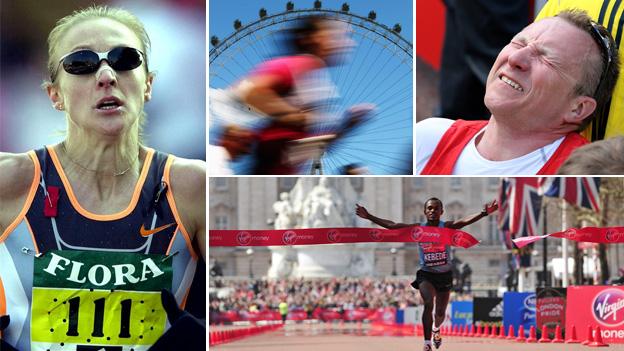
There will be sweat, spittle and probably some tears on the streets of London on Sunday.
The majority of the 30,000-strong field at this year's London Marathon will complete the race, but there will be tough times for them all; moments when legs will wobble, when they feel as if they can't go on.
Marathon world record holder Paula Radcliffe, six-time wheelchair winner Baroness Tanni Grey-Thompson, and the oldest man and woman competing in this year's race give their advice on how to battle through the pain and finish one of the toughest races of them all.
Paula Radcliffe - Count to 100 in your head
Radcliffe set her world record of two hours 15 minutes and 25 seconds in the London Marathon in 2003. The 40-year-old has won the London and New York marathons three times.
"Everybody, whatever level you're running at, will go through at least one difficult period in the race.
"It can come out of the blue, but it's rarely in the first half of the race. Even when I've run a personal best I've still gone through rough spots.
"It's important not to panic and to keep focused. Use little techniques to make yourself think about the moment, whether it's singing to yourself, counting landmarks or counting in your head - anything.
"I used to count to 100 three times in my head and I knew that was roughly a mile.
"That helped me break down the mile into smaller chunks so instead of thinking 'I've got 12 miles left', you're just counting 'one, two, three...' and that's all you're thinking about. You will disappear into your own little world.
"There will be times when you start questioning yourself and it's during those times you must think back to the preparation you've done. Nine times out of 10 the race is much easier than your longest training run. You're rested, you're fresher and you have the support of the crowd, use their energy.
"Have an idea of what time you want to do but if you're feeling better than expected, throw that out of the window, and, equally, if you're feeling rough, stop looking at the clock and concentrate on completing the race."
Paul Freedman - Follow a nice bum
Paul Freedman, 89, is the oldest runner at this year's London Marathon. He has taken part in every London Marathon since 1991, except 2004 when he was recovering from a heart attack.
"Last year I was asked what kept me going and I replied by saying 'I get behind a nice bum and go from there!, external' I was joking, of course.
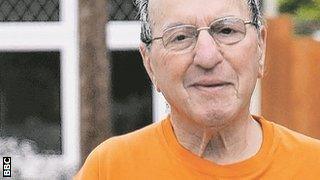
"I run in an orange bib and on the back it says 'oldest marathon runner' so when I'm walking along I get a tap on the shoulder from people asking me how old I am. By the time I've done four or five miles I've got bruises from all the tapping!
"But it's a case of taking one mile at a time. My running days are over. It's hard for me these days, I am almost down to walking pace, but what keeps me going is raising money for the hospice, external I'm running for and the thought of my friends and family at the finishing line."
Tanni Grey-Thompson - Sing 'Sweet Dreams'
Tanni Grey-Thompson is the most successful athlete in paralympic history and during her 13-year sporting career won the London Marathon (women's wheelchair division) six times.
"I used to sing Eurythmics's Sweet Dreams (Are Made of This), external because the beat of that is really good for maintaining a good average speed.
"Wheelchair racing is a bit more like cycling. It's more like a stage race in the Tour de France, completely different to running the London Marathon.
"In wheelchair races you're more likely to have a pack race and I would always try to stay in the pack, mainly because I was a stronger sprinter and I used to find racing on my own really hard. If I was on my own that's when the Eurythmics song would come in.
"If you're in a pack there's loads of stuff to think about, like breakaways, and there's a lot of protection being in the pack, because of slipstreaming and protection from the wind, so there's no time to sing or count."
Prof Greg Whyte - Remember your motivation
Professor Whyte has worked on 22 Comic and Sport Relief challenges, including helping celebrities such as David Walliams (swimming the Channel) and Davina McCall (swimming, cycling and running from Edinburgh to London).
"Being positive is important to cope with the rigours of a marathon. However, being overly positive can often result in an unrealistic belief that the marathon will be entirely positive. Being confident in your ability is crucial but you do not want to be arrogant.
Need the toilet? Essential marathon tips
"Most people become emotional during a marathon. When you are pushing your body and mind to their limits for such a long period of time it is inevitable, and acceptable, that emotions play a part.
"Hitting the wall is the culmination of a number of factors but primarily it happens when you are very low on energy, usually carbohydrates. As well as physical symptoms of fatigue and a reduction in pace you will also have psychological changes related to mood, such as increased anger and depression.
"That is entirely avoidable by ensuring you run your race at your pace, and your nutrition is well planned and executed so take on board fluid and fuel - little, often, and early.
"When the going gets tough just think about why you are doing it. What is your motivation? Is it to raise money or awareness for a loved one? Is it a personal goal of achievement?
"Keep putting one foot in front of the other. Great journeys are made with small steps."
James Cracknell - Put your headphones on
Double Olympic rowing gold medallist and adventurer James Cracknell ran his first London Marathon in 2006.
"It's tough going from a team event like rowing, where everybody knows when you're not giving 100%, to an individual event where it's only you who knows if you're not giving 100%.
"You know the pain will hit you at some point and it's down to you how much you're prepared to give.
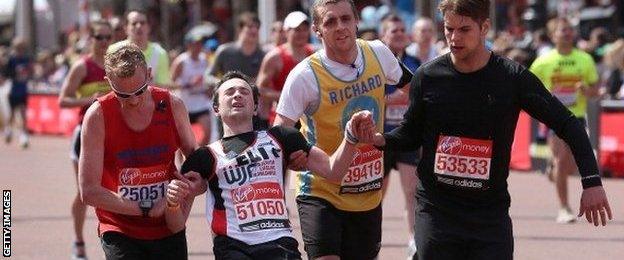
"I usually take a pair of headphones with me, but not to listen to music, it's just so that nobody talks to me. They think I'm listening to music and it gives me the excuse not to be rude and to blank everything out.
"Also, when you look around there are people who clearly look in pain. There's always someone else who is in more pain so that can be a reassurance during the tough moments."
Iva Barr - Don't be afraid to walk
At 86 years old Iva Barr, external is the oldest female runner taking part in this year's London Marathon. She started running aged 55 and this will be her 15th London Marathon.
"Different people want different things out of the marathon but you don't have to run around with your eyes popping out like organ stops. I don't use a watch and never have.
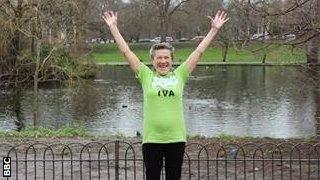
"For someone who just wants to complete the race, don't be afraid to walk. It's better to walk a little bit rather than push yourself. It's a bit silly to get annoyed for being 30 seconds behind your target.
"The London Marathon is absolutely fabulous, it's like a big street party, and you don't have to rush around because there are people who will talk to you. On one occasion I kissed as many policemen en route as I could!"
Chris Finill - Take enough fluid on board
Chris Finill, 55, is one of 15 runners who have finished every London Marathon since it began in 1981. He has completed every one in under three hours. , external
"One of the most important things to do is to take on board fluid and not to think you can't stop for 10 seconds because most people aren't running to get a super time.
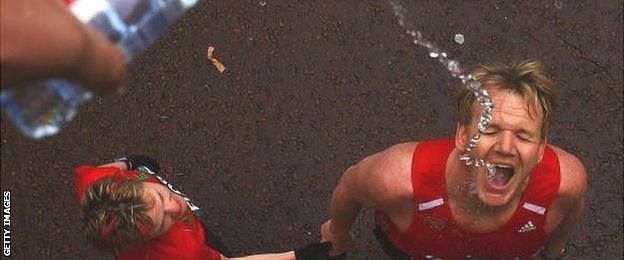
"If that means you stop running for 30 seconds then so be it. Try energy drinks before the race and, if you don't like them, just regard them as medicine.
"And if you are trapped among people, don't weave through them, conserve your energy and just relax. The most important night sleep is the Friday to Saturday before the race. If you are lying in bed, tossing and turning on the Saturday night don't panic because it won't affect you too much.
"The challenge for me is to say I have run all the London Marathons in under three hours. It won't be easy because I have a niggling hamstring injury, but I will definitely finish. Two years ago I ran across America and if I can do that then I can do the London Marathon. They will have to scrape me off the road!"
Susie Hewer - Don't push yourself too hard
Susie Hewer, 56, has previously broken two Guinness World Records at the London Marathon and is attempting to break her own record this year for stitching the longest crochet chain while running a marathon.
"Sometimes when I get tired during a race I will picture my mum, external who died of vascular dementia in 2005,, external aged 89. There was one time when I thought I wouldn't be able to finish and that was at the London Marathon in 2012.
"I had decided I was going to push for a better time, to break my previous best. I got to the halfway mark and felt fantastic, but at mile 14 I had a massive asthma attack and felt like death.
"The last mile took me 30 minutes to complete and I ended up finishing in five hours and 47 seconds. I was beside myself with grief and nothing was going to convince me it wasn't the end of the world.
"I've still got the fridge magnet with my time on it from 2012 and it motivates me. Every time I look at the fridge it makes me angry!"
James Hughes & John Courtney - Say a prayer
James Hughes,, external 47, is a blind runner and this year will be his 19th London Marathon. He has completed every race with his guide and foster parent John Courtney, 76.
John Courtney: "James was born without eyes and the obstacles he has had to overcome are immense. He just runs independently a pace behind me. I will talk to him and the trust he shows is phenomenal.
"There certainly are tough times during the marathon, especially when getting water and at the start of the race because of the number of people, and it generally takes us five hours to complete it.
"We won't start running until two hours into the marathon because that's when the gaps open up and we'll get through the difficult times by singing our song - 'Run Rabbit Run' - and when it's really getting tough we sing 'Pack Up Your Troubles'.
"We have our own ritual. At the start of the race we will say a prayer and the spirit of London, the spectators, help you on."
Mike Lomas - Block out the pain
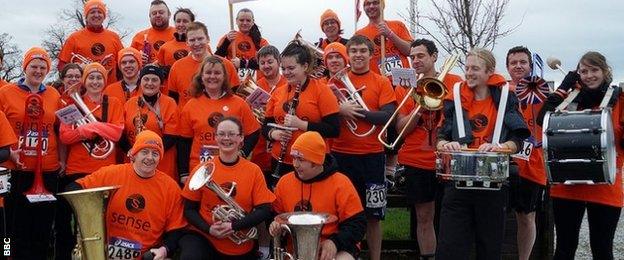
Huddersfield Marathon Band , externalwere the world's first and fastest marching band to complete a marathon in 2011. The 31 members, aged 18 to 50, are looking to regain the record they lost to a German band, who crossed the line in seven hours, 22 minutes and 55 seconds.
"I play the cornet, so I've got it easy, but we've got four drummers and two sousaphone, external players, which are heavy instruments, so they've had to strengthen their backs.
"Four members of the band have to finish in record time if we are to break the record. I talk to the band all the time and tell them that they have to block out the pain.
"We will have to march at about 10 minutes a kilometre if we are to break the record so it's quite fast and because they are all brass or wind players they will have to control their breath to prevent themselves from passing out through exhaustion.
"It's the relentlessness of it that is difficult. We only have 30 seconds between each piece of music and it's difficult maintaining that discipline for 26 miles. We've got three books of music, from Michael Jackson to marches, and they are all upbeat songs. They have to be fast.
"I'm in the middle so if anyone is struggling I will be able to manage it from the centre. I will tell them it's only seven hours of pain and usually they react well but sometimes someone will turn around and have a go at you."
- Published10 April 2014
- Published10 April 2014
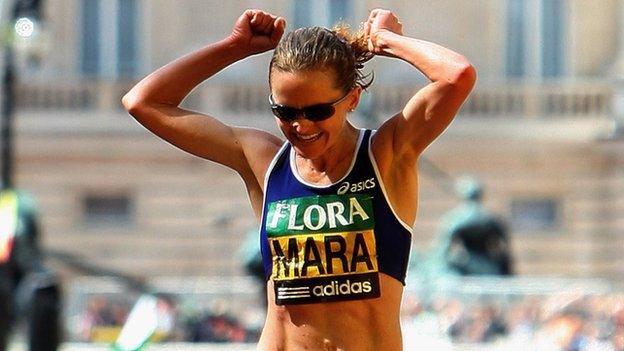
- Published10 April 2014
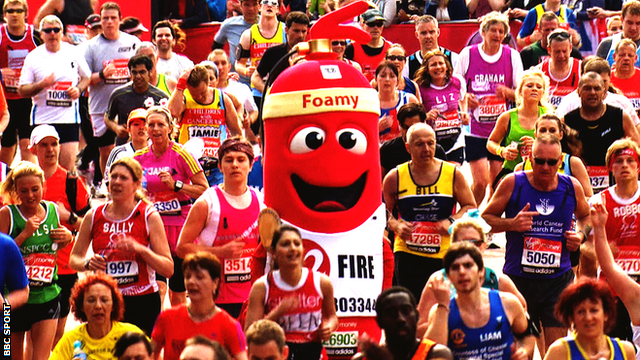
- Published10 April 2014
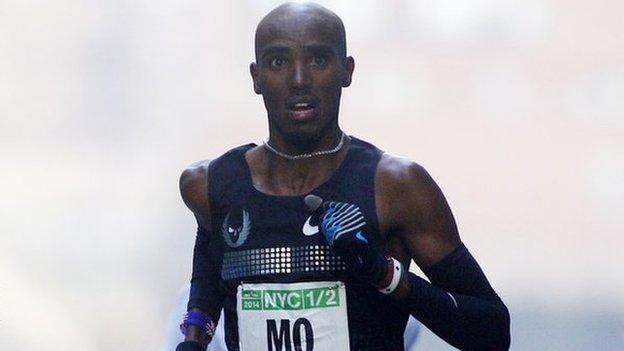
- Published8 April 2014
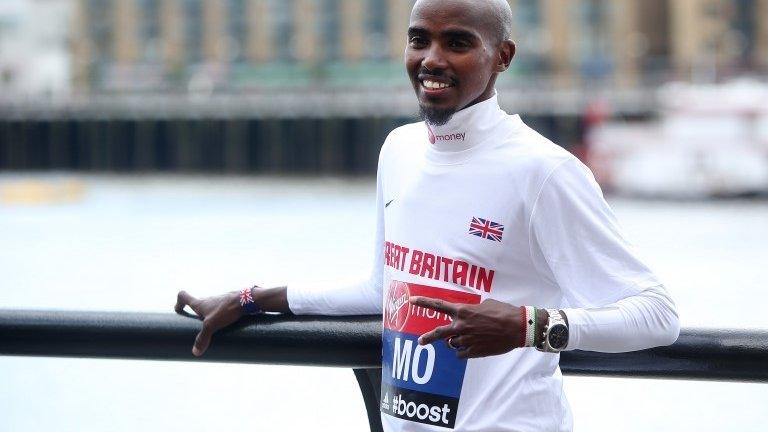
- Published10 September 2015

- Published8 February 2019
